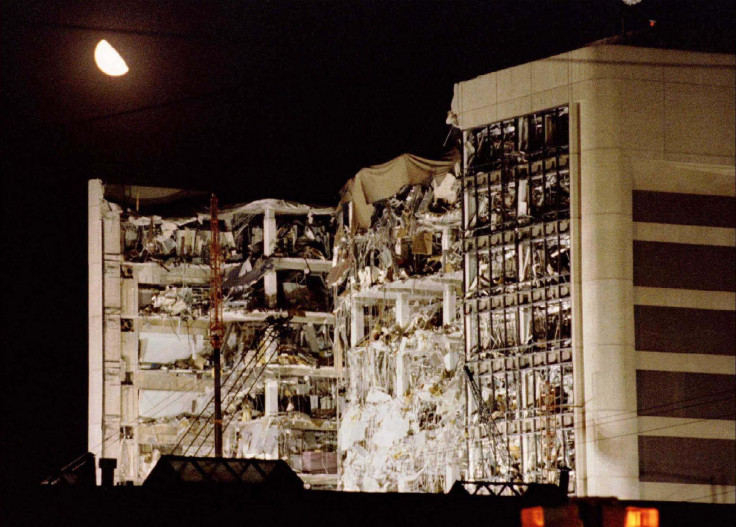Oklahoma City Bombing 20 Years Later: Photos And Quotes From Leaders And Survivors Of The Nation’s Worst Homegrown Terrorist Act

Twenty years after the Oklahoma City Bombing, survivors of the catastrophe have said the memory of the attack is something they will never lose. The bombing of the Alfred P. Murrah Federal Building in downtown Oklahoma City, Oklahoma, on the morning of April 19, 1995, is considered one of the worst acts of domestic terrorism in American history. It was carried out by ex-Army soldier and security guard Timothy McVeigh who, according to federal authorities, rented a moving truck, built a powerful bomb made out of agricultural fertilizer, diesel fuel and other explosive chemicals, and parked it in front of the building.
After McVeigh ignited the bomb, the blast reduced the surrounding area to rubble, and many of the federal building’s floors were flattened. But the death toll was what shocked the world: 168 people, including 19 children, were killed. More than 680 others were injured. McVeigh was convicted in 1997 for the bombing and executed in 2001. His accomplice, Terry Nichols, was sentenced to spend the rest of his life in prison.
Some of the bombing survivors were children who at the time attended America’s Kids Daycare center, which was located inside of the federal building. P.J. Allen, who was 1 year old when he was pulled out of the rubble, grew up constantly questioning the attack. “I didn't realize how close I was to not making it out," Allen told People magazine last week. “It was almost like I was being set free. I promised myself I would just seize opportunities and try my best at everything."
Here are other quotes about the bombing from news accounts, the McVeigh trial and from leaders who reacted to the bombing:
''About the time I got 'Hello' and 'Good morning' out of my mouth, the bomb hit ... All I remember is following the blood trail from somebody before me.'' -- Former Marine Corps recruiter Michael Norfleet, who worked on the sixth floor of the federal building when the bomb exploded, during the McVeigh trial in 1997.
''Basically there are four elements I have to receive information regarding'' ... BOOM! - Attorney Cynthia Lou Klaver, on an audiotape of a meeting she was chairing in a building across the street when the bomb exploded. The tape was played during the McVeigh trial in 1997.
“You have lost too much, but you have not lost everything. And you have certainly not lost America, for we will stand with you for as many tomorrows as it takes. … If anybody thinks that Americans are mostly mean and selfish, they ought to come to Oklahoma. If anybody thinks Americans have lost the capacity for love and caring and courage, they ought to come to Oklahoma.” - President Bill Clinton, during the prayer service for bombing victims in 1995.
"This is not a time for celebration. A man's life is being taken from him. It's something that we wanted, and it's not done out of revenge. It's because we felt it was necessary." -- Jannie Coverdale, whose two grandsons died in the bombing, after McVeigh was sentenced to death.
"There is no such thing as closure for people who lost family in the bombing. The only closure is when they close the lid on my casket." -- Darlene Welch, whose 4-year-old niece was killed, after McVeigh was sentenced to death.
"I believe [McVeigh] was a hero, but his judgment was off. ... I think it would have been better if he bombed the building at 2 or 3 in the morning without massive loss of life." -- Dennis Mahon, a member of the White Aryan Resistance, after McVeigh was sentence to death.
© Copyright IBTimes 2024. All rights reserved.












